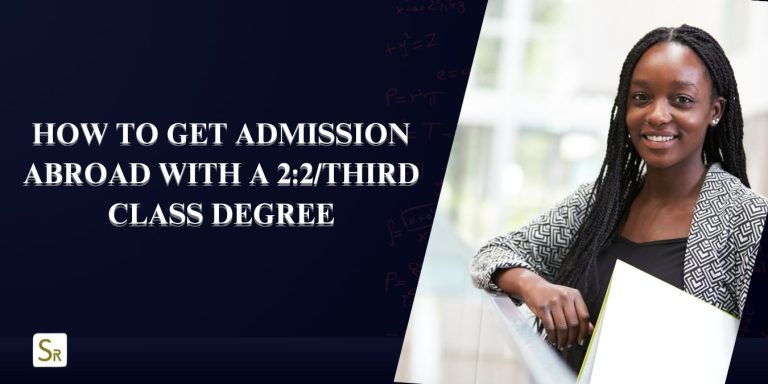Securing admission to an international university with a 2nd Class Lower (2:2) degree, typically equivalent to a CGPA of 2.5–3.4 on a 5.0 scale or 50–59% in many grading systems, is challenging but achievable with a strategic approach. A 2:2 degree may not meet the entry requirements for top-tier institutions or highly competitive programs, but numerous reputable universities worldwide accept such qualifications for postgraduate studies. This guide provides a detailed, step-by-step approach to enhance your chances of admission abroad, drawing on practical strategies and actionable insights.
Understand the Implications of a 2:2 Degree
A 2:2 degree is often viewed as a lower academic achievement compared to a First Class (1:1) or 2nd Class Upper (2:1) degree, which are typically required for prestigious programs. However, many universities recognize that academic grades do not fully reflect a candidate’s potential, especially for international students with diverse backgrounds. Focus on institutions and programs that value holistic applications, considering factors like work experience, skills, and motivation alongside grades.
Research Universities with Flexible Admission Criteria
Start by identifying universities that accept 2:2 degrees for postgraduate programs, particularly coursework-based master’s degrees, which often have less stringent academic requirements than research-based programs. In the UK, universities like Coventry University, University of Hertfordshire and Birmingham City University frequently admit students with 2:2 degrees for programs in business, engineering and social sciences. In Canada, institutions such as the University of Manitoba and Thompson Rivers University offer pathways for 2:2 holders, while in Europe, universities in Germany (e.g., University of Siegen) and Sweden (e.g., Linnaeus University) are known for flexible criteria.
Check each university’s website for specific entry requirements, as some programs may require additional qualifications, such as relevant work experience or higher grades in specific subjects. Contact admissions offices directly to clarify eligibility, as some institutions may consider borderline cases or offer conditional admissions. Compile a list of 10–15 universities to diversify your options and increase your chances of acceptance.
Leverage Relevant Work Experience
Professional experience can significantly strengthen your application, especially if your academic grades are modest. Universities often value practical skills gained through internships, full-time jobs, or freelance work, particularly if they align with your intended field of study. For example, a 2:2 graduate applying for a master’s in computer science can highlight software development projects or IT certifications to demonstrate competence.
Document your experience in a detailed CV, emphasizing achievements, responsibilities, and skills relevant to the program. If you lack extensive experience, consider volunteering, part-time work, or short-term projects to build your profile before applying. Aim to accumulate at least 1–3 years of relevant experience, as this can make your application stand out.
Craft a Persuasive Statement of Purpose (SOP)
The Statement of Purpose is a critical component of your application, allowing you to present a compelling narrative about your academic and professional journey. Use the SOP to explain why you earned a 2:2 degree, if applicable, without making excuses—focus on challenges overcome, lessons learned, and your commitment to future success. Clearly articulate your career goals, how the program aligns with them, and why you are a strong candidate despite your grades.
Structure your SOP with an introduction that grabs attention, a body detailing your background and motivations, and a conclusion reinforcing your fit for the program. Keep it concise (500–800 words, per university guidelines) and tailored to each institution, mentioning specific faculty, courses, or resources that attract you. Proofread meticulously to avoid errors, as a polished SOP reflects your professionalism.
Obtain Strong Letters of Recommendation
Recommendation letters from credible sources can bolster your application by providing third-party validation of your abilities. Choose referees who know you well, such as professors who supervised your projects or employers who can attest to your work ethic and skills. Provide them with details about the program and your goals to ensure their letters are specific and relevant.
Request 2–3 letters, depending on university requirements, and ensure they highlight qualities like problem-solving, leadership, or academic potential that compensate for your 2:2 grade. Follow up politely to confirm submission deadlines, as late letters can delay your application. Strong recommendations can tip the scales in your favor, especially for programs with holistic review processes.
Excel in Standardized Tests
High scores in standardized tests like the GRE, GMAT, IELTS, or TOEFL can offset a lower academic grade, as many universities use these to assess international applicants’ readiness. For example, a strong GRE score (above 300) can make you competitive for engineering or science programs in the US, while a GMAT score of 600+ is valuable for business programs. Similarly, an IELTS score of 7.0 or TOEFL score of 100+ demonstrates language proficiency, a key requirement for non-native English speakers.
Prepare thoroughly using official study materials, online courses, or coaching centers, aiming to score in the top 20–30% for your target programs. Submit your scores directly to universities and highlight them in your application to draw attention away from your 2:2 grade. Some universities may waive these tests for applicants with relevant experience, so check program-specific policies.
Explore Postgraduate Diplomas or Pre-Master’s Programs
If your 2:2 degree does not meet direct entry requirements for a master’s program, consider postgraduate diplomas (PGD) or pre-master’s programs as stepping stones. These programs, offered by universities in the UK (e.g., Kaplan International Pathways), Canada and Australia, provide foundational coursework to prepare you for graduate studies. Successful completion often guarantees progression to a full master’s degree.
Research institutions offering these pathways, such as Navitas in Australia or INTO University Partnerships in the UK, and confirm that they lead to your desired program. These options are particularly useful for fields like business, IT, or education, where coursework-based pathways are common. Be prepared for additional tuition costs, but view them as an investment in your academic future.
Target Countries with Favorable Admission Policies
Certain countries are more accommodating to students with 2:2 degrees due to their education systems or international student policies. In the UK, a 2:2 is widely accepted for master’s programs, with institutions like the University of Portsmouth and Anglia Ruskin University offering diverse options. In Canada, universities like Cape Breton University prioritize holistic applications, while in Germany, tuition-free public universities like the University of Kassel may admit 2:2 holders with strong profiles.
Australia’s Group of Eight (Go8) universities, such as the University of Queensland, occasionally accept 2:2 degrees for specific programs, especially with relevant experience. Scandinavian countries like Sweden and Norway also offer flexible criteria, with English-taught programs at institutions like Uppsala University. Research visa requirements, as some countries (e.g., Canada, Australia) tie post-study work opportunities to your program, enhancing long-term prospects.
Pursue Scholarships and Funding Opportunities
Financial constraints should not deter you from studying abroad, as many scholarships prioritize potential over academic grades. In the UK, Chevening Scholarships and Commonwealth Scholarships support international students from eligible countries, while Germany’s DAAD scholarships fund master’s programs for 2:2 holders with strong profiles. Universities also offer merit-based or need-based awards, such as the International Student Scholarship at the University of Alberta in Canada.
Search for funding on platforms like ScholarshipPortal, FastWeb, or university websites, and apply early to meet deadlines. Tailor your scholarship essays to highlight your resilience, goals, and contributions to your field, even with a 2:2 degree. Securing funding can also make your application more appealing to admissions committees, signaling external validation of your potential.
Enhance Your Academic Profile
Supplement your 2:2 degree with additional qualifications to demonstrate your commitment to learning. Online courses from platforms like Coursera, edX, or Udemy in fields like data analysis, project management, or digital marketing can add value to your application. Professional certifications, such as Cisco’s CCNA for IT or ACCA for accounting, are particularly impactful for technical or business programs.
Consider publishing articles, presenting at conferences, or contributing to open-source projects to showcase your expertise. These efforts not only improve your CV but also provide talking points in your SOP and interviews. Aim to complete 1–2 relevant qualifications before applying to strengthen your academic narrative.
Apply Early and Strategically
Submitting applications early demonstrates enthusiasm and ensures you meet deadlines, which vary by country (e.g., October–January for UK, September–February for Canada). Use a spreadsheet to track requirements, deadlines, and application statuses for each university. Apply to a mix of “reach” (competitive), “match” (aligned with your profile), and “safety” (high acceptance likelihood) schools to maximize your chances.
Pay attention to application fees, which range from $50–150 per university, and prioritize institutions with the best fit. Double-check that all documents—transcripts, test scores, SOP, recommendations—are complete and submitted correctly. Follow up with universities to confirm receipt and address any issues promptly.
Prepare for Interviews (If Required)
Some programs, especially in business or research fields, may require interviews to assess your fit. Prepare by researching the program thoroughly and practicing common questions, such as “Why this university?” or “How will you contribute to the program?” Highlight your strengths, such as work experience or skills, and be ready to discuss how you’ve overcome academic challenges.
Conduct mock interviews with mentors or peers to build confidence and refine your responses. If interviews are conducted online, ensure a stable internet connection and a professional setting. A strong interview performance can sway admissions decisions in your favor.
Navigate Visa and Immigration Processes
Once admitted, secure a student visa for your destination country, which requires proof of admission, financial resources, and other documents. For example, the UK Tier 4 visa requires a Confirmation of Acceptance for Studies (CAS), while Canada’s study permit needs proof of funds for tuition and living expenses. Start the visa process early, as processing times vary (e.g., 3–8 weeks for most countries).
Consult official government websites or embassy resources for accurate requirements, and consider hiring a reputable immigration consultant if needed. Ensure your passport is valid for the duration of your studies and comply with all visa conditions to avoid complications.
Stay Resilient and Persistent
Applying abroad with a 2:2 degree may involve rejections but persistence is key. Reflect on feedback from unsuccessful applications to improve future submissions. Seek guidance from mentors, alumni, or online forums like Reddit’s r/gradadmissions for insights and encouragement.
Build a support network of peers or professionals who can review your application materials or share their experiences. Stay organized, maintain a positive outlook, and view each application as a learning opportunity. With determination, you can secure admission to a program that aligns with your goals.
Conclusion
Gaining admission abroad with a 2:2 degree requires careful planning, a strong application, and a proactive approach to showcasing your potential. By targeting flexible universities, leveraging experience, excelling in tests, and crafting compelling narratives, you can overcome academic limitations and access global education opportunities. Start your journey today by researching programs, building your profile, and applying strategically to turn your study abroad aspirations into reality.
If you need assistance with university research, SOP drafting, or visa guidance, feel free to ask for tailored support.




